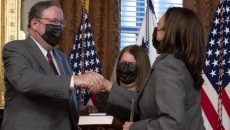OTTAWA - Auditor general Karen Hogan released several reports on the federal government's response to the COVID-19 pandemic.
Here are five key highlights:
Poor quarantine enforcement for international travellers
Canada failed to adequately enforce border measures designed to keep international travellers from bringing cases of COVID-19 into the country.
The auditor general says the Public Health Agency of Canada had no idea what became of 59 per cent of travellers suspected of flouting quarantine orders after the agency referred their suspicions to law enforcement.
The government also only had records to verify 25 per cent of mandatory stays in quarantine hotels. It was missing or unable to match 30 per cent of COVID-19 test results to incoming travellers from Feb. to June 2021.
Failure to ensure protection of migrant farm workers from COVID-19
The auditor general says federal inspectors are failing to ensure agricultural producers are properly protecting migrant workers from COVID-19.
Hogan says that includes some situations where inspectors have received reports and evidence that health and safety violations have occurred.
The report blames excessive workloads for inspectors and a lack of urgency within the department.
It adds that despite raising the issue with senior officials in December 2020 and February 2021, the problems actually got worse this year.
Uneven access to federal assistance for businesses
The auditor general gave regional development agencies credit for the speed with which they created and delivered COVID-19 relief and recovery funds to thousands of businesses and organizations.
However, that sense of urgency and the vast array of agencies involved meant applicants faced different standards and requirements for accessing funds.
The auditor general also found federal support might have flowed to some recipients who were not actually eligible.
Failure to prepare for national food crisis
Ottawa was found to have failed to develop a national emergency response plan for a crisis affecting Canadians’ food security, even though the government has identified food as a “critical infrastructure” since 2009.
An emergency plan drawn up in 2019 was not put into effect because it was “insufficient to tackle a governmentwide response to a crisis affecting all of society.” Planning for emergencies with provinces and territories was also not focused on a crisis of this scale.
However, government departments and agencies did manage to swiftly create new emergency food programs, using mechanisms already in place.
Delayed political appointment underscored 'significant deficiency' in dairy commission's governance
Concerns were raised about Canadian Dairy Commission's governance as a delay in the Liberal government's appointment of a new director left the three-member board with only two directors for an extended period of time.
The auditor general says that raised the risk that the board would not be able to meet or could not make decisions, particularly if one of the other two members was absent or in a conflict of interest.
The board was able to avoid such a situation, but Hogan recommended the commission stay in close contact with the agriculture minister's office to avoid a repeat of the situation.






